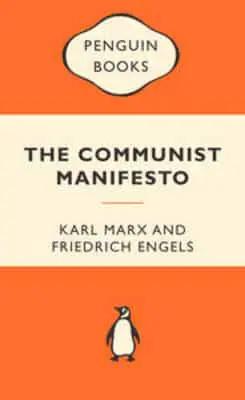The Communist Manifesto: Popular Penguins

Ratings/reviews counts are updated frequently.
Check link for latest rating. ( 191,505 ratings, 12,751 reviews)Read More
Found a better price? Request a price match

The Communist Manifesto: Popular Penguins
Book Hero Magic created this recommendation. While it's new and still learning, it may not be perfect - your feedback is welcome! IS THIS YOUR NEXT READ?
The Communist Manifesto: Popular Penguins
The Communist Manifesto changed the face of the twentieth century beyond recognition, inspiring millions to revolution, forming the basis of political systems that still dominate countless lives and continuing to ignite violent debate about class and capitalism today.
The Communist Manifesto: Popular Penguins by Karl Marx stands as one of history's most influential political manuscripts. Originally published in 1848, this seminal work offers a profound critique of capitalism and its societal consequences, advocating for a classless and stateless society. Marx, alongside Friedrich Engels, meticulously outlines the theory of historical materialism and the inevitability of class struggle, offering a blueprint for revolutionary action and socialist transformation. Their eloquent and impassioned rhetoric calls upon the oppressed working class, or proletariat, to rise against the bourgeoisie, challenging the structures of economic exploitation and political domination.
The manifesto comprises a clear and compelling narrative that examines the dynamics of capitalism, its exploitation of labour, and the resulting socio-economic inequalities. By tracing the development of class relations through historical epochs, Marx and Engels reveal the systemic roots of oppression and the inherent contradictions within the capitalist system. They argue for a revolutionary upheaval that would dismantle capitalist institutions, redistribute wealth, and establish a society founded on the principles of collective ownership and equality.
This edition, part of the Popular Penguins series, preserves the urgency and revolutionary spirit that has inspired countless individuals and movements worldwide. The manifesto's enduring relevance is evident in its ability to instigate debate and action in response to contemporary issues of economic disparity, globalisation, and social justice. The book not only serves as a foundational text for socialist thought but also as a critical tool for understanding the ongoing struggles against capitalist exploitation and advocating systemic change.
Book Hero Magic summarised reviews for this book. While it's new and still learning, it may not be perfect - your feedback is welcome! HOW HAS THIS BEEN REVIEWED?
The Communist Manifesto: Popular Penguins by Karl Marx is praised for its enduring relevance and insightful critique of capitalist society. Readers value its historical significance and revolutionary ideas, although some find its language challenging. Others appreciate the succinctness and potency of its arguments in advocating for social change.

Book Details
INFORMATION
ISBN: 9780141194899
Publisher: Penguin Books Ltd
Format: Paperback / softback
Date Published: 28 June 2010
Country: United Kingdom
Imprint: Penguin Books Ltd
Audience: General / adult, Tertiary education, Professional and scholarly
DIMENSIONS
Spine width: 20.0mm
Width: 111.0mm
Height: 180.0mm
Weight: 172g
Pages: 288
About the Author
Date- 2013-08-06 Charles Darwin was born on February 12, 1809 in Shropshire, England. He was educated at Edinburgh University and Christ's College, Cambridge. Between 1831 and 1836 he travelled in South America aboard the H.M.S Beagle to explore the geology and natural history of the area, and published his journal of findings in 1839. His most famous book On the Origin of the Species by Means of Natural Selection, appeared in 1859 and is arguably one of the most important scientific works ever published. The theories of evolution and natural selection proposed in this book and The Descent of Man (1871) are still the subject of intense debate and scrutiny today. Charles Darwin died on 19 April, 1882 and was buried in Westminster Abbey. Karl Marx was born in 1818 in Trier, Prussia. While attending university in Berlin he was influenced by the ideas of the philosopher Hegel and his critics, the Young Hegelians, but Marx eventually rejected both schools of thought. He quickly earned the reputation of a revolutionary and left Germany for Paris, where he met his lifelong friend and collaborator, Friedrich Engels. Together they wrote and published The Communist Manifesto, which was published in 1848, just before the first wave of revolutions in France. Marx returned to Germany but his radical activities led to expulsion, whereupon he moved to London. There, Marx and Engels collaborated on further works on economics and contemporary politics. Marx also wrote his major treatise, Das Kapital, but only the first volume was published in his lifetime. Marx died in poverty on March 14, 1883, and was buried in Highgate Cemetery. Friedrich Engels (1820-95) was the son of a Manchester factory owner. He wrote several groundbreaking essays on contemporary social and political conditions in Britain, including The Condition of the Working Class in England (1845), in which he criticised the working conditions and treatment of the urban poor. After Karl Marx' death, Engels completed and published the last two volumes of Das Kapital (1884, 1894) from his friend's surviving papers. Karl Marxwas born at Trier in 1818 of a German-Jewish family converted to Christianity. As a student in Bonn and Berlin he was influenced by Hegel's dialectic, but he later reacted against idealist philosophy and began to develop his theory of historical materialism. He related the state of society to its economic foundations and mode of production, and recommended armed revolution on the part of the proletariat. In Paris in 1844 Marx met Friedrich Engels, with whom he formed a life-long partnership. Together, they prepared the Manifesto of the Communist Party (1848) as a statement of the Communist League's policy. In 1848 Marx returned to Germany and took an active part in the unsuccessful democratic revolution. The following year he arrived in England as a refugee and lived in London until his death in 1883. Helped financially by Engels, Marx and his family nevertheless lived in great poverty. After years of research (mostly carried out in the British Museum), he published in 1867 the first volume of his great work, Capital. From 1864 to 1872 Marx played a leading role in the International Working Men's Association, and his last years saw the development of the first mass workers' parties founded on avowedly Marxist principles. Besides the two posthumous volumes of Capital compiled by Engels, Karl Marx's other writings include The German Ideology, The Poverty of Philosophy, The 18th Brumaire of Louis Bonaparte, The Civil War in France, A Contribution to the Critique of Political Economy, Grundrisse- Foundations of the Critique of Political Economy and Theories of Surplus-value.
Also by Karl Marx
View allMore from Politics & Current Affairs
View allWhy buy from us?
Book Hero is not a chain store or big box retailer. We're an independent 100% NZ-owned business on a mission to help more Kiwis rediscover a love of books and reading!

Service & Delivery
Our warehouse in Auckland holds over 80,000 books and puzzles in-stock so you're not waiting for your order to arrive from overseas.

Auckland Bookstore
We're primarily an online store, but for your convenience you can pick up your order for free from our bookstore, which is right next door to our warehouse in Hobsonville.

Our Gifting Service
Books make wonderful thoughtful gifts and we're here to help with gift-wrapping and cards. We can even send your gift directly to your loved one.
































